As devoted dog owners, we cherish our furry companions and want to share every moment with them – often including meal times. However, it’s crucial to understand that many common human foods, while perfectly safe and even healthy for us, can be incredibly dangerous, even lethal, for our canine friends. Their digestive systems and metabolisms differ significantly from ours, making seemingly innocuous ingredients toxic. Knowing what are some things dogs can’t eat is not just about avoiding an upset stomach; it’s about safeguarding their lives.
Pet poisonings are a distressing reality, with common household foods being a frequent culprit. This comprehensive guide from Dog Care Story aims to be your go-to resource, providing clear information on which foods to strictly avoid, why they pose a threat, and what safe alternatives you can offer your beloved dog. By arming yourself with this knowledge, you can prevent accidental ingestion and ensure your dog enjoys a long, healthy, and happy life free from preventable food-related hazards. For a broader understanding of what to keep away from your canine companion, explore our detailed resource on what human foods dogs can not eat.
Why Certain Foods Are Toxic to Dogs
The question of what dogs can’t eat stems from fundamental biological differences between humans and canines. Dogs process substances differently, leading to varying levels of toxicity for certain compounds. What might be easily metabolized by a human can accumulate rapidly in a dog’s system, causing severe illness or even death.
Take chocolate, for instance. Humans can readily process theobromine and caffeine, but dogs metabolize these methylxanthines much slower. This slow processing allows these toxic substances to build up to dangerous levels in their bodies, affecting their nervous system and heart. Similarly, while cherries are a delightful human snack, their pits, stems, and leaves contain cyanide, which can hinder a dog’s red blood cells from carrying oxygen properly if consumed in large quantities. Moreover, fruit pits can present a physical obstruction risk, leading to painful gastrointestinal issues like diarrhea or blockages.
The severity of food toxicity can also depend on several factors, including the dog’s size, breed, age, and existing health conditions. A small breed dog might react severely to a tiny amount of a toxic substance that a large breed could potentially tolerate with mild symptoms. Puppies and elderly dogs often have more sensitive digestive and immune systems, making them more vulnerable. Therefore, if you ever have questions or concerns about specific foods and your dog’s unique health profile, always consult your veterinarian immediately. They can provide tailored advice and ensure your pet’s safety.
A Comprehensive List of Foods Dogs Cannot Eat
Many everyday household foods are not only unhealthy but outright dangerous for dogs. This list details common foods your dog should never eat, explaining why they are harmful and outlining potential symptoms. Remember, this is not an exhaustive list, so always exercise caution and consult your vet if unsure about a particular food. To help you further, we have compiled an extensive guide on what food dogs can t have.
1. Alcohol
Even a small amount of alcohol can be deadly for pets due to their smaller size and different metabolism. Symptoms of alcohol poisoning in dogs mirror those in humans, including vomiting, disorientation, breathing difficulties, coma, and in severe cases, death. Keep all alcoholic beverages and products containing alcohol far out of reach.
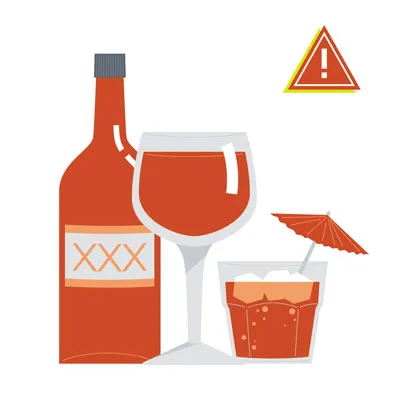 A glass of wine with grapes and cheese in the background, representing alcohol toxicity in dogs.
A glass of wine with grapes and cheese in the background, representing alcohol toxicity in dogs.
2. Apple, Apricot, Cherry, and Plum Seeds/Pits
While the fleshy part of an apple is safe (without the core and seeds), the core and seeds contain cyanide. Small amounts might be tolerated, but it’s always safest to avoid them entirely. Apricot, cherry, peach, and plum pits also harbor cyanide, which can lead to vomiting, rapid or irregular heartbeat, seizures, coma, and even be fatal by interfering with oxygen transport in red blood cells. These pits also pose a choking hazard and can cause gastrointestinal obstruction.
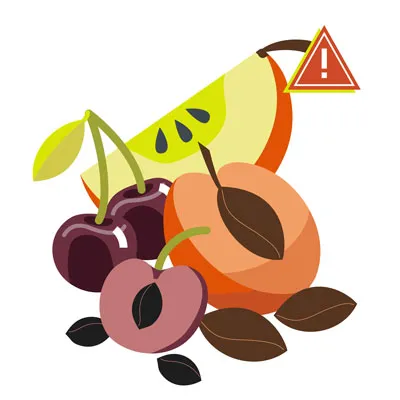 Assorted fruit pits and seeds from apples, apricots, cherries, and plums, highlighting their danger to dogs.
Assorted fruit pits and seeds from apples, apricots, cherries, and plums, highlighting their danger to dogs.
3. Avocado
Avocados contain persin, a fungicidal toxin. While the toxicity of persin in dogs is debated and less severe than in some other animals (like birds or horses), it’s still best to avoid feeding avocado. Furthermore, the large pit can cause a significant gastrointestinal obstruction, requiring emergency veterinary intervention. Therefore, it’s safer to keep this food away from your canine companion.
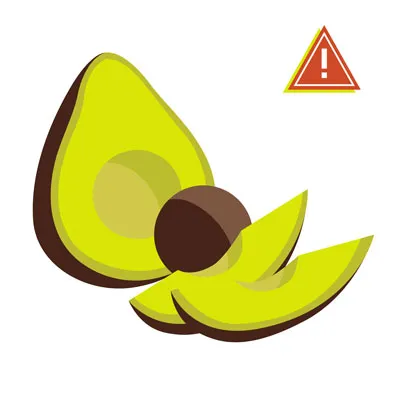 A halved avocado with its pit, illustrating a food item dogs should avoid.
A halved avocado with its pit, illustrating a food item dogs should avoid.
4. Broccoli
Broccoli contains isothiocyanates, which can cause mild to severe gastric irritation in dogs if consumed in very large quantities. While a very small, occasional amount might be okay for some dogs, it’s generally best to avoid it since there are so many other healthier and safer vegetable options available. Additionally, broccoli stalks can be a choking hazard or cause gastrointestinal obstruction, particularly in smaller dogs.
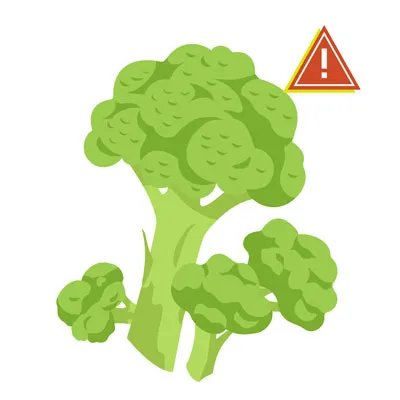 Fresh green broccoli florets, cautionary for dogs in large amounts.
Fresh green broccoli florets, cautionary for dogs in large amounts.
5. Caffeine and Coffee Grounds
Caffeine, like chocolate, contains methylxanthines. These stimulants can cause hyperactivity, restlessness, vomiting, diarrhea, tremors, seizures, heart arrhythmias, and even death. The darker the coffee or tea, the higher the caffeine content. Coffee grounds, tea bags, energy drinks, and certain medications are all potential sources of caffeine poisoning. Even a small amount of coffee grounds can lead to a dangerously racing heart and severe symptoms.
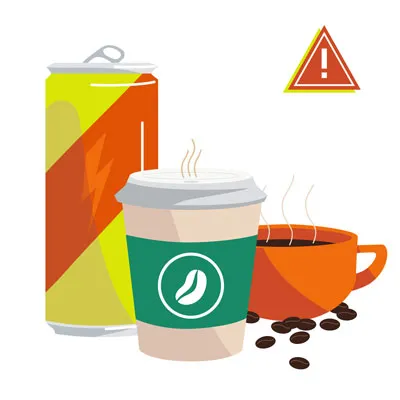 A cup of coffee with coffee beans, symbolizing the danger of caffeine to dogs.
A cup of coffee with coffee beans, symbolizing the danger of caffeine to dogs.
6. Chicken and Turkey Skin, Ham, and Other Fatty Cuts of Meat
High-fat foods like chicken or turkey skin, ham, bacon, and other fatty meat trimmings are detrimental to a dog’s health. Their rich fat content can trigger acute pancreatitis, a painful and potentially life-threatening inflammation of the pancreas with severe complications. Instead of feeding fatty scraps, opt for lean, cooked, unseasoned meat in moderation.
It’s also crucial to avoid giving dogs cooked bones from chicken, turkey, or any other animal. Cooked bones become brittle and can splinter, causing internal damage such as cuts, obstructions, or punctures in the stomach or intestines, which can lead to fatal infections. This is particularly important during holidays like Thanksgiving, where festive food leftovers might be abundant.
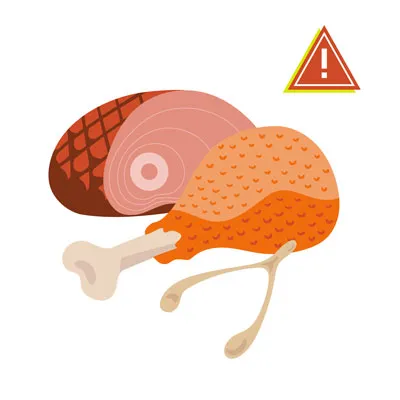 Assorted fatty cuts of meat including chicken skin and ham, dangerous for dogs.
Assorted fatty cuts of meat including chicken skin and ham, dangerous for dogs.
7. Chocolate
Chocolate is one of the most well-known toxic foods for dogs. It contains theobromine and caffeine, which dogs cannot metabolize efficiently. The darker the chocolate (baker’s chocolate, dark chocolate), the higher the concentration of theobromine and thus the more toxic it is. Milk chocolate and even some sugar-free chocolates can be problematic, especially if they contain xylitol.
Symptoms of chocolate toxicity can range from mild gastrointestinal upset (vomiting, diarrhea) to hyperactivity, increased thirst, restlessness, tremors, seizures, abnormal heart rhythm, and in severe cases, death. Even a small amount of dark chocolate can be dangerous for a small dog. If your dog ingests any chocolate, contact your veterinarian immediately.
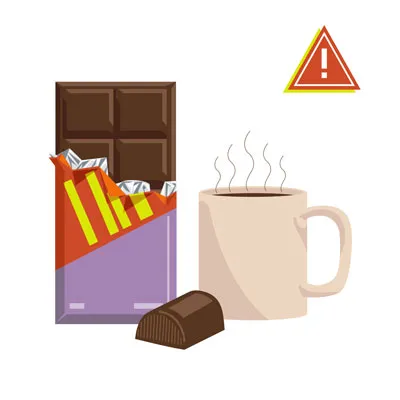 Pieces of dark chocolate and chocolate chips, a major toxic food for dogs.
Pieces of dark chocolate and chocolate chips, a major toxic food for dogs.
8. Grapes and Raisins
Grapes and raisins are highly toxic to dogs and can cause acute kidney failure, even in small amounts. The exact toxic mechanism is still not fully understood, but tartaric acid is believed to be a key component. Symptoms can appear within hours and include vomiting, diarrhea, lethargy, loss of appetite, abdominal pain, and decreased or absent urine production. These signs indicate severe kidney damage. Prompt veterinary attention is critical if your dog has consumed any grapes or raisins.
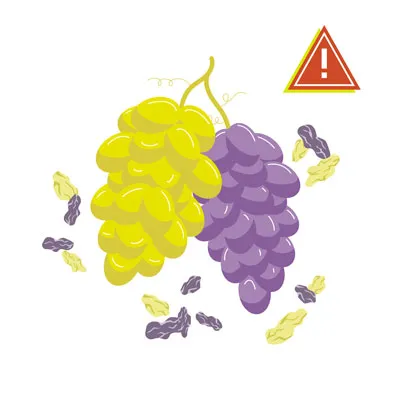 A bunch of red grapes and several raisins, highly toxic to dogs.
A bunch of red grapes and several raisins, highly toxic to dogs.
9. Macadamia Nuts, Almonds, and Pistachios
Macadamia nuts are highly toxic to dogs, causing symptoms like weakness, tremors, vomiting, fever, and depression. While the exact toxic agent is unknown, as few as six nuts can cause significant illness in a small dog. Other nuts, while not necessarily toxic, can still be dangerous. Almonds and pistachios, for example, pose a choking hazard, especially if whole. Their high-fat content can also lead to gastrointestinal upset or pancreatitis over time. Additionally, many flavored or spiced nuts contain ingredients like salt or garlic which are also harmful to dogs. When considering what should dogs not be fed from your pantry, nuts are a definite no-go.
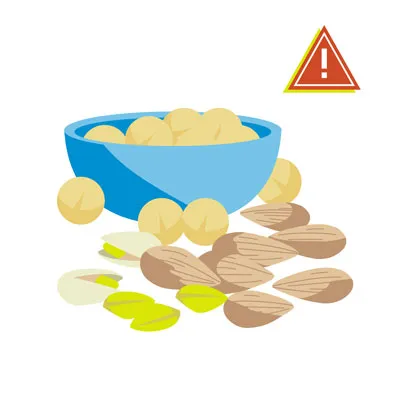 A bowl of macadamia nuts with some almonds and pistachios scattered, indicating the danger of various nuts for dogs.
A bowl of macadamia nuts with some almonds and pistachios scattered, indicating the danger of various nuts for dogs.
10. Milk and Dairy Products
Many dogs are lactose intolerant because they lack sufficient lactase, the enzyme needed to digest lactose in milk. Consuming milk or dairy products can lead to gastrointestinal upset, including diarrhea, gas, and abdominal pain. While some dogs may tolerate small amounts, it’s generally best to avoid dairy.
Ice cream is particularly bad due to its high sugar and fat content, which can cause digestive issues or contribute to weight gain. If you want to offer a cool treat, consider frozen healthy fruits instead. Small quantities of lower-fat cheeses might be acceptable for some dogs, but always monitor for adverse reactions. Consult your veterinarian for advice on specific dairy products.
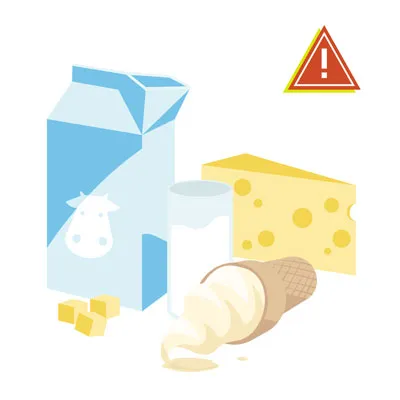 A glass of milk and a cheese wedge, representing dairy products dogs may have difficulty with.
A glass of milk and a cheese wedge, representing dairy products dogs may have difficulty with.
11. Mushrooms
It’s safest to assume all mushrooms found in the wild are toxic to dogs, as distinguishing between safe and poisonous varieties is incredibly difficult. Wild mushrooms can contain various toxins that may cause liver or kidney failure, vomiting, diarrhea, neurological symptoms like hallucinations or seizures, and red blood cell damage. While washed, plain white grocery store mushrooms are generally considered safe in very small amounts, the risk of misidentification or adverse reactions means it’s usually best to choose a different, unequivocally safe treat for your dog.
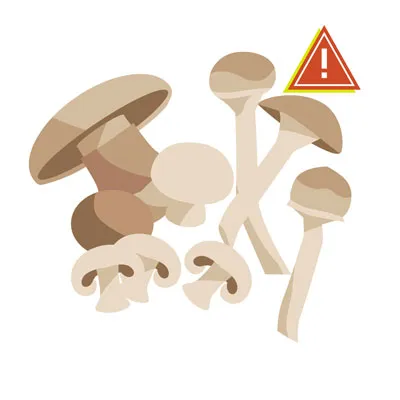 Various types of mushrooms, highlighting the caution needed for dogs.
Various types of mushrooms, highlighting the caution needed for dogs.
12. Nutmeg and Cinnamon
Nutmeg contains myristicin, a compound that can cause hallucinations, disorientation, increased heart rate, and severe gastrointestinal upset, including vomiting. The effects are more pronounced in smaller dogs or with higher doses. Cinnamon, while not strictly toxic, can cause irritation to a dog’s mouth and digestive tract. In larger quantities, it might also lead to a dangerous drop in blood sugar levels. Both spices should be kept away from your dog, especially in baked goods where they are often concentrated.
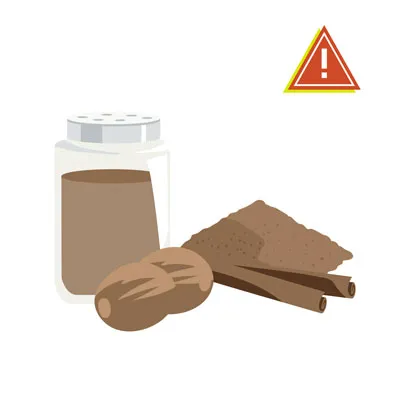 Nutmeg seeds and cinnamon sticks, representing spices that are harmful or irritating to dogs.
Nutmeg seeds and cinnamon sticks, representing spices that are harmful or irritating to dogs.
13. Onions, Garlic, Chives, and Leeks (Allium Family)
All members of the allium family—onions, garlic, chives, and leeks—are highly toxic to dogs. They contain compounds called sulfoxides and disulfides, which can damage a dog’s red blood cells, leading to hemolytic anemia. Symptoms include weakness, lethargy, pale gums, rapid breathing, vomiting, diarrhea, and dark urine. Garlic is often considered more potent than onions. These ingredients are commonly found in many human foods, including powdered forms in spices, sauces, and even some baby foods, so careful label reading is essential. Japanese breeds like Akitas and Shiba Inus are particularly sensitive, but all dogs are at risk.
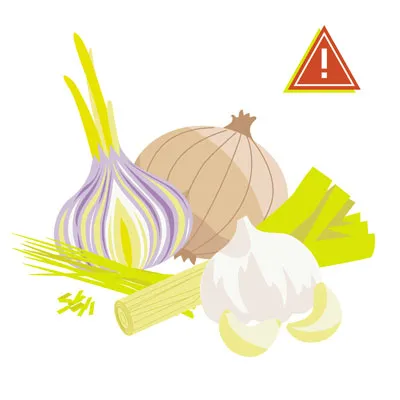 Assortment of onions, garlic, chives, and leeks, known to be toxic to dogs.
Assortment of onions, garlic, chives, and leeks, known to be toxic to dogs.
14. Salt
Excessive salt intake can lead to sodium ion poisoning in dogs. This can cause various neurological and systemic issues, including tremors, seizures, vomiting, diarrhea, extreme thirst, lethargy, kidney damage, and even coma. Common sources include salty snacks like potato chips, pretzels, and certain processed foods, as well as rock salt used for de-icing. Ensure your dog always has access to fresh water to help prevent dehydration.
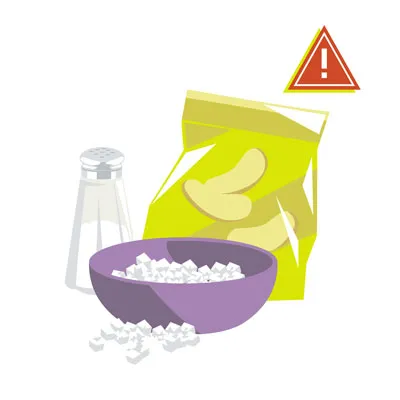 A pile of coarse salt, indicating its danger in excessive amounts for dogs.
A pile of coarse salt, indicating its danger in excessive amounts for dogs.
15. Spicy Food
Spicy foods, containing ingredients like chili peppers, cayenne, or other hot spices, can cause significant gastrointestinal upset in dogs. Symptoms often include vomiting, diarrhea, excessive thirst, and stomach pain. While not typically lethal, the discomfort can be severe, and in some cases, lead to more serious issues like gastritis or ulcers. It’s always best to keep your dog away from anything spicy to avoid painful digestive episodes.
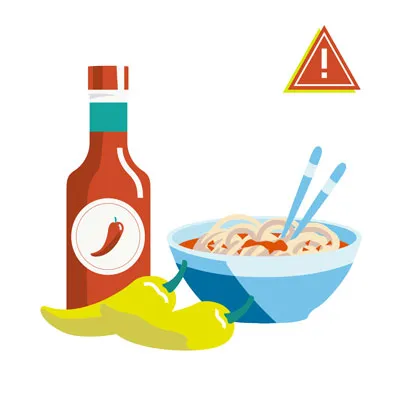 A red chili pepper, symbolizing spicy foods that dogs should avoid.
A red chili pepper, symbolizing spicy foods that dogs should avoid.
16. Sugar-Free Gum and Candy (Xylitol)
Xylitol is an artificial sweetener found in numerous sugar-free products, including gum, candy, mints, peanut butter, toothpaste, certain baked goods, and even some medications. It is extremely toxic to dogs. Even small amounts can cause a rapid and severe drop in blood sugar (hypoglycemia), leading to weakness, loss of coordination, seizures, and liver failure.
The speed and severity of xylitol poisoning necessitate immediate veterinary care. The amount of xylitol in just a few pieces of sugar-free gum can be fatal for a medium-sized dog. Always check food labels for xylitol and keep any products containing it securely out of your dog’s reach.
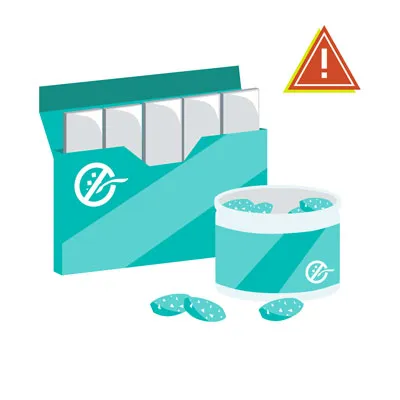 Sugar-free gum and candies, containing xylitol which is highly toxic to dogs.
Sugar-free gum and candies, containing xylitol which is highly toxic to dogs.
17. Tomatoes and Raw Potatoes
The ripened red fruit of a tomato plant is generally considered safe for dogs in moderation. However, the green parts of the plant (stems, leaves) and unripe green tomatoes contain solanine, a glycoalkaloid that is toxic to dogs. Solanine can cause severe gastrointestinal upset, lethargy, weakness, and neurological symptoms.
Similarly, cooked potatoes (baked or boiled, plain) are safe in small amounts. But raw potatoes, especially green ones or those sprouting, also contain solanine. Always peel and cook potatoes thoroughly before offering them to your dog, ensuring no additives like salt or butter are present. When considering what vegetables not to give dogs, remember that some vegetables have safe and unsafe forms.
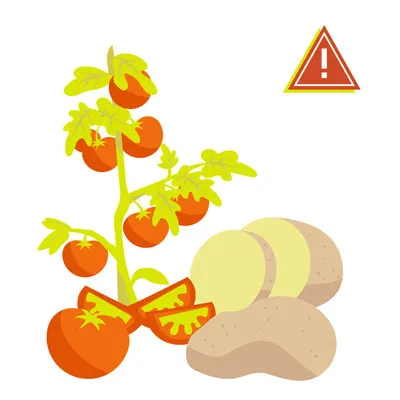 Unripe green tomatoes and raw potatoes, containing solanine which is toxic to dogs.
Unripe green tomatoes and raw potatoes, containing solanine which is toxic to dogs.
18. Tobacco
Tobacco products, including cigarettes, cigars, chewing tobacco, and nicotine-containing e-liquids or patches, are highly toxic to dogs. Nicotine is a potent neurotoxin that can cause a rapid onset of severe symptoms, including vomiting, diarrhea, agitation, tremors, weakness, rapid breathing, an abnormal heart rate, and seizures. Ingesting large amounts can lead to coma and be fatal. Dogs’ curious nature often leads them to investigate discarded cigarette butts or open ashtrays. If your dog consumes any tobacco product, seek emergency veterinary care immediately.
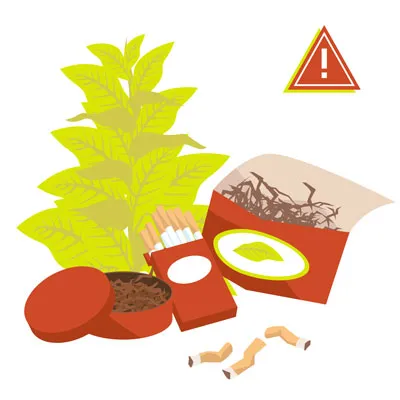 Cigarettes and tobacco, highlighting the dangers of nicotine poisoning in dogs.
Cigarettes and tobacco, highlighting the dangers of nicotine poisoning in dogs.
19. Yeast and Raw Dough
Raw yeast dough is extremely dangerous for dogs for two main reasons. First, the warm, moist environment of a dog’s stomach can cause the dough to rise and expand, leading to severe abdominal pain, bloating, and potentially life-threatening gastric dilatation and volvulus (GDV), or stomach torsion/rupture. Second, the yeast in the dough ferments sugars, producing alcohol. This fermentation in the stomach can lead to alcohol toxicity, causing symptoms similar to human alcohol poisoning, which can rapidly become fatal without immediate medical intervention. Always keep raw dough far out of reach.
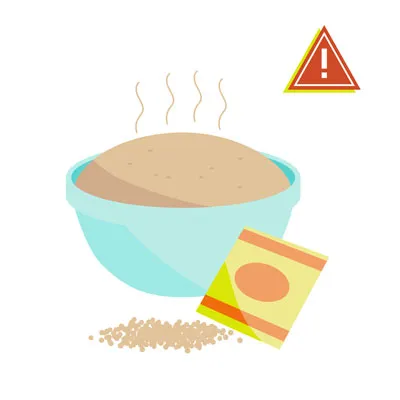 Raw dough with yeast, indicating the dangers of expansion and alcohol toxicity for dogs.
Raw dough with yeast, indicating the dangers of expansion and alcohol toxicity for dogs.
20. Raw Meat
While some dog owners advocate for raw diets, feeding raw or undercooked meat carries significant risks. Raw meat can harbor dangerous bacteria like Salmonella, E. coli, and Listeria, which can cause severe gastrointestinal illness in dogs and also pose a zoonotic risk to humans in the household. Additionally, raw meat often contains bones, which, even when uncooked, can splinter, cause choking, or lead to internal injuries or obstructions. It is always safest to cook meat thoroughly to eliminate pathogens and remove all bones before feeding it to your dog.
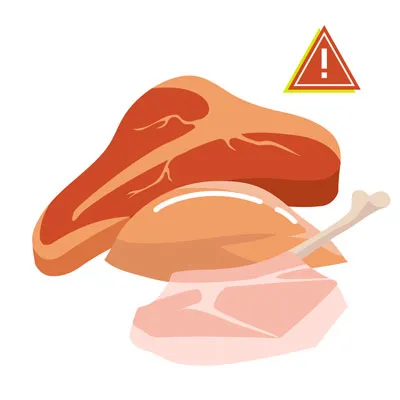 Slices of raw red meat, representing the potential dangers of bacteria and bones for dogs.
Slices of raw red meat, representing the potential dangers of bacteria and bones for dogs.
21. Rhubarb
Rhubarb is commonly used in human desserts but is not safe for pets. Its leaves, and to a lesser extent the stalks, contain soluble calcium oxalate crystals. Ingested in sufficient quantities, these crystals can bind with calcium in the dog’s body, causing a dangerous drop in blood calcium levels (hypocalcemia) and potentially leading to acute kidney failure. Symptoms can include tremors, weakness, excessive drooling, changes in thirst and urination, bloody urine, and vomiting.
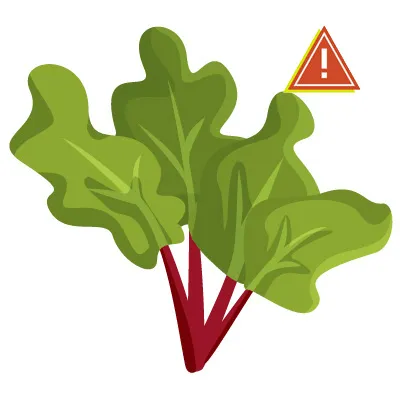 Fresh rhubarb stalks and leaves, toxic to dogs due to oxalate crystals.
Fresh rhubarb stalks and leaves, toxic to dogs due to oxalate crystals.
22. Star Fruit
Similar to rhubarb, star fruit also contains soluble calcium oxalate crystals. While it may look appealing, it’s another fruit that should not be given to your dog. Consumption can lead to similar symptoms as rhubarb poisoning, including kidney issues, weakness, and gastrointestinal upset.
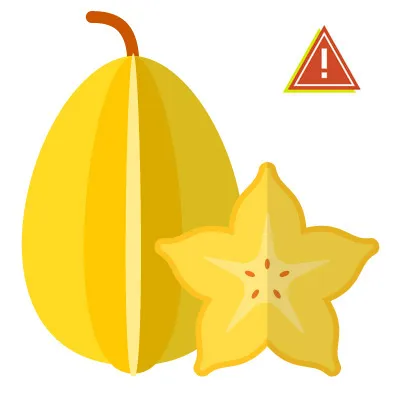 A sliced star fruit, indicating it is unsafe for dogs due to oxalate crystals.
A sliced star fruit, indicating it is unsafe for dogs due to oxalate crystals.
23. Flavored and Seltzer Water
It is always best to give your dog plain, fresh, clean drinking water. Flavored waters often contain added sugars, artificial sweeteners (like xylitol), or other additives that are harmful to dogs. Seltzer or carbonated waters, even plain ones, can cause gas and bloating, which can be uncomfortable or, in severe cases, contribute to conditions like GDV in susceptible breeds. Stick to the basics to keep your dog properly hydrated and safe.
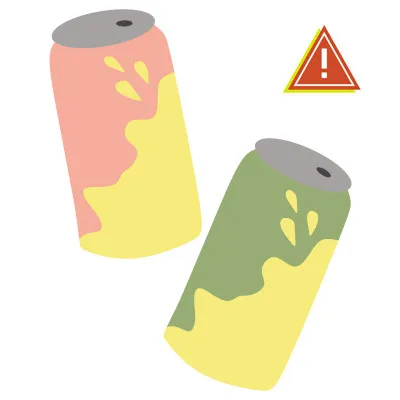 A glass of seltzer water with lime, advising caution for dogs.
A glass of seltzer water with lime, advising caution for dogs.
Safe and Healthy Foods Your Dog Can Enjoy
While the list of things dogs can’t eat is extensive, there are plenty of human foods that are perfectly safe and even beneficial for your dog in moderation. These can make excellent, healthy treats. Here are some popular options:
1. Apples, Oranges, and Bananas
Apples (without the core and seeds) are a crunchy, healthy snack rich in vitamins A and C and fiber. Cut them into small pieces to prevent choking. Oranges, in small amounts and peeled (without seeds), offer Vitamin C. Bananas, without the peel and in moderation, are a good source of potassium and vitamins, providing a soft, sweet treat.
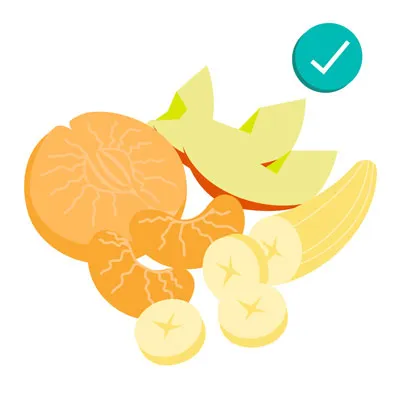 A selection of apples, oranges, and bananas, safe fruits for dogs in specific preparations.
A selection of apples, oranges, and bananas, safe fruits for dogs in specific preparations.
2. Blueberries and Blackberries
These small berries are packed with antioxidants, fiber, phytochemicals, and Vitamin C, making them an excellent healthy treat for dogs. They are low in calories and can be given fresh or frozen for a cool snack.
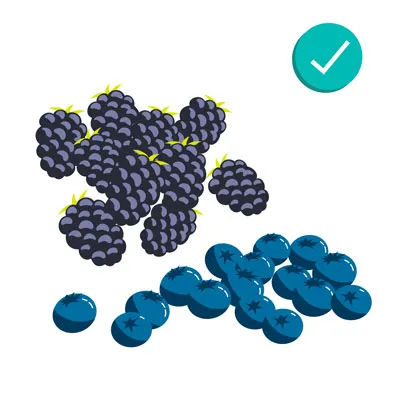 Fresh blueberries and blackberries, healthy and safe options for dogs.
Fresh blueberries and blackberries, healthy and safe options for dogs.
3. Cantaloupe, Mango, Peaches, Pears, Pineapples, and Watermelon
Many fruits can be safely enjoyed by dogs! Cantaloupe is hydrating and rich in vitamins. Watermelon, served without seeds or rind, is mostly water and a refreshing treat on a hot day. Mangoes, peaches, and pears (all pitted/cored and peeled) offer vitamins and fiber. Pineapples, in small, peeled, cored pieces, provide vitamins and minerals. Always remove seeds, pits, and rinds to prevent choking or toxic exposure.
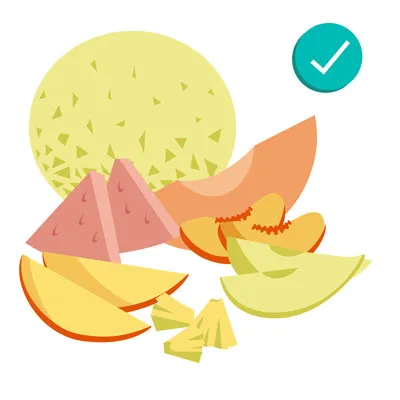 Various fruits including cantaloupe, mango, peaches, pears, pineapples, and watermelon, safe for dogs when prepared correctly.
Various fruits including cantaloupe, mango, peaches, pears, pineapples, and watermelon, safe for dogs when prepared correctly.
4. Carrots, Cucumber, and Celery
These “three C’s” are fantastic low-calorie, high-fiber options, especially beneficial for overweight dogs. Carrots are crunchy and good for dental health. Cucumber slices offer vitamins and minerals with minimal carbs and fats. Celery has a satisfying crunch and can even help with bad breath. Cut all into bite-sized pieces.
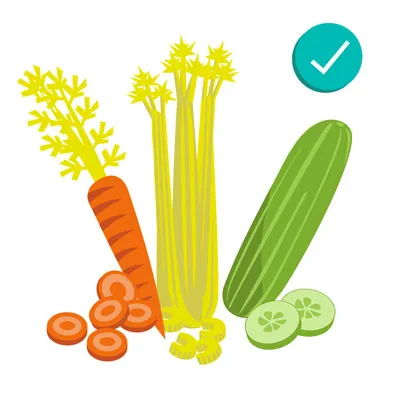 Carrots, cucumbers, and celery stalks, healthy vegetable and fruit choices for dogs.
Carrots, cucumbers, and celery stalks, healthy vegetable and fruit choices for dogs.
5. Cheese
While dairy can be problematic for lactose-intolerant dogs, small amounts of low-fat cheese (like mozzarella or cottage cheese) can be an acceptable treat for many. Always introduce in small quantities and monitor for digestive upset. Avoid high-fat or strongly flavored cheeses.
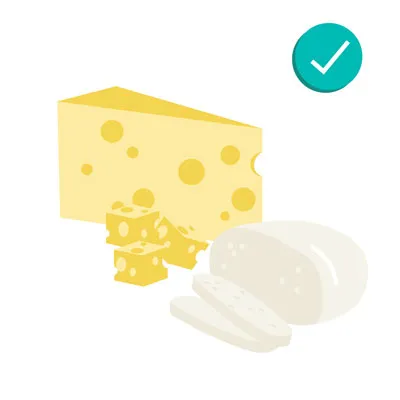 Cubes of cheese, a safe treat in moderation for most dogs.
Cubes of cheese, a safe treat in moderation for most dogs.
6. Eggs
Fully cooked eggs are an excellent source of protein and can be a delicious, nutritious treat. Scrambled or hard-boiled (plain, without oil or seasoning) eggs can even help soothe an upset stomach.
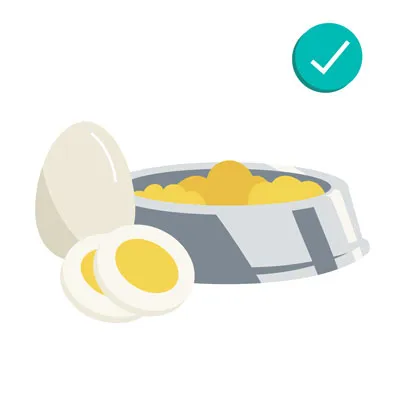 Cooked eggs, a good source of protein and safe for dogs.
Cooked eggs, a good source of protein and safe for dogs.
7. Peanuts, Peanut Butter, and Cashews
Plain, unsalted, unflavored peanuts and cashews can be given in very small quantities as occasional treats due to their high-fat content. Peanut butter is a popular dog treat, but it’s crucial to choose unsalted, natural varieties that contain no xylitol (which is highly toxic). Always give in moderation. If you have a particularly fussy canine friend, you might also find our advice on my dog is a picky eater what can i do helpful for finding other safe and appealing foods.
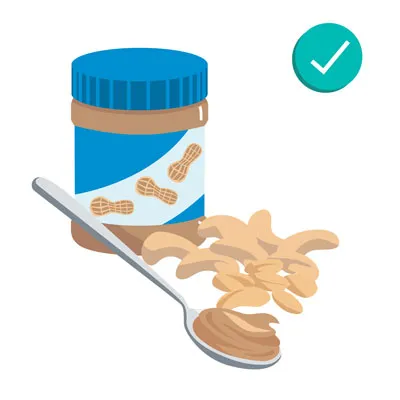 Peanuts, peanut butter, and cashews, safe in moderation for dogs if unsalted and xylitol-free.
Peanuts, peanut butter, and cashews, safe in moderation for dogs if unsalted and xylitol-free.
8. Popcorn and Corn
Air-popped, plain, unsalted, and unbuttered popcorn can be a fun, occasional treat. Ensure all unpopped kernels are removed to prevent choking. Corn (removed from the cob) is also safe when served plain.
 Popcorn and corn on the cob (cob removed is safe), plain forms are acceptable for dogs.
Popcorn and corn on the cob (cob removed is safe), plain forms are acceptable for dogs.
9. Coconut and Honey
In small quantities, plain coconut flesh, milk, and oil are generally safe and may even offer benefits like lauric acid. However, some dogs might experience digestive upset, so introduce cautiously. Avoid coconut water (high potassium) and the fibrous shell (choking hazard). Honey, in moderation, provides vitamins and minerals and is a safe, sweet treat.
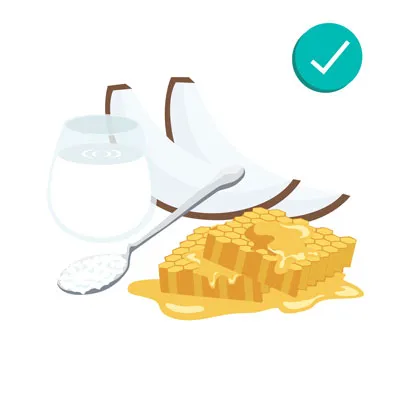 Coconut with honey, both safe in small amounts for dogs.
Coconut with honey, both safe in small amounts for dogs.
10. Shrimp and Fish
Plain, fully cooked shrimp (peeled, de-veined, no head/tail/legs) is a lean protein source. Cooked, boneless fish like salmon and sardines (plain, not seasoned) are excellent sources of omega-3 fatty acids. Limit fish to twice a week to avoid mercury accumulation. Plain, canned tuna packed in water (not oil), in moderation, is also safe.
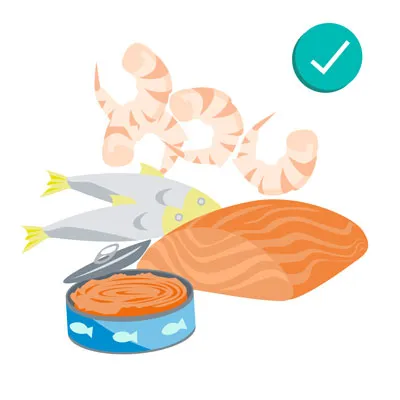 Cooked shrimp and fish fillets, safe and healthy protein sources for dogs.
Cooked shrimp and fish fillets, safe and healthy protein sources for dogs.
11. Turkey
Cooked, unseasoned, boneless, skinless turkey meat is a lean and healthy protein source for dogs. Offer small bites as a treat or mixed with their regular food. Always remove fat and bones.
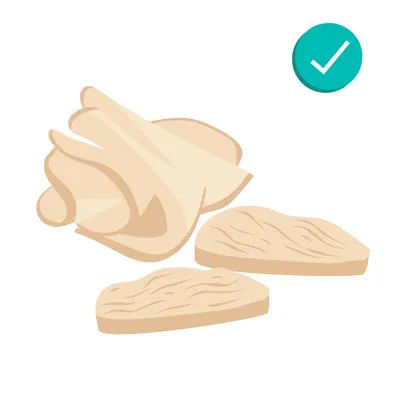 Cooked turkey meat, a healthy protein source for dogs when prepared correctly.
Cooked turkey meat, a healthy protein source for dogs when prepared correctly.
12. Grains, Wheat, and Quinoa
Many dog foods contain grains, and plain cooked grains like wheat, rice, and quinoa are generally safe in moderation. Quinoa is a particularly healthy option. Monitor your dog for any signs of allergies if introducing new grains.
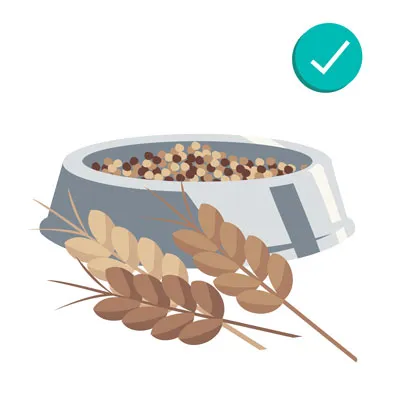 Grains including wheat and quinoa, generally safe for dogs in moderation.
Grains including wheat and quinoa, generally safe for dogs in moderation.
13. Green Beans
Green beans are a popular, healthy, and low-calorie snack that many dogs love. They can be served raw, steamed, or from a can (ensure no added salt or spices). Cut them into small pieces to prevent choking.
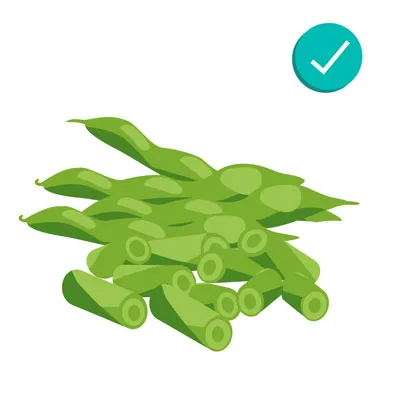 Fresh green beans, a safe and healthy vegetable option for dogs.
Fresh green beans, a safe and healthy vegetable option for dogs.
What Dogs Are Most at Risk if They Consume Toxic Foods?
While no dog should ever consume toxic foods, certain factors can make some dogs more vulnerable to severe reactions and complications:
- Small Breeds vs. Large Breeds: Smaller dogs are at significantly higher risk because their lower body weight means a smaller amount of a toxic substance can lead to a much higher concentration in their system, causing more severe poisoning.
- Puppies: Young dogs have developing digestive and immune systems, making them less equipped to handle toxins. Their curiosity also makes them more prone to ingesting inappropriate items.
- Elderly Dogs: Older dogs may have compromised organ function, pre-existing health conditions, or slower metabolism, which can exacerbate the effects of toxic substances and make recovery more challenging.
- Dogs with Pre-existing Conditions: Dogs suffering from conditions like diabetes, kidney disease, liver disease, pancreatitis, or gastrointestinal sensitivities are at a much higher risk of severe complications from consuming toxic or even just unsuitable foods. Their systems are already stressed, and toxins can push them into crisis more easily.
How to Prevent Dogs from Eating Toxic Foods
Accidents can happen, but proactive measures can significantly reduce the risk of your dog ingesting unsafe human foods.
1. Store Foods Out of Reach
The simplest and most effective prevention method is to keep all dangerous foods and ingredients out of your dog’s access. Store toxic items on high shelves, in locked cabinets, or in sealed containers that your dog cannot open or reach. This includes pantry items, medications, and even garbage bins containing food scraps.
2. Avoid Feeding Dogs from Your Plate
Resist the urge to feed your dog scraps from your plate or during meal preparation, no matter how much they beg. This habit teaches them that human food is fair game, increasing the likelihood they will try to snatch food that is harmful. It’s safest to only give your dog treats specifically formulated for canines.
3. Educate Family Members and Guests
Ensure everyone in your household, including children and visitors, understands the importance of not feeding your dog human food. Clearly communicate which foods are dangerous and emphasize that no food should be given without your explicit permission, regardless of how tempting it may be.
4. Be Extra Cautious During Holidays and Gatherings
Holidays and social gatherings often involve an abundance of food and a bustling environment, making it easier for a dog to sneak a bite of something dangerous. During these times, be extra vigilant. Consider confining your dog to a safe, quiet space away from the main food preparation and eating areas, or keep them on a leash under direct supervision. Ensure garbage cans are securely covered or placed out of reach.
Despite all precautions, accidents can still occur. Be prepared by having emergency contact information readily available for your veterinarian, an emergency veterinary clinic (especially one open 24/7), and a pet poison control hotline. Quick action can make a critical difference.
What to Do if Your Dog Eats Something Toxic
If you suspect your dog has eaten something toxic, acting quickly is paramount. Early intervention often leads to a more successful outcome.
First, familiarize yourself with the common symptoms of food toxicity. These can vary depending on the substance ingested but often include:
- Vomiting (with or without blood)
- Diarrhea (with or without blood)
- Lethargy or weakness
- Loss of appetite
- Excessive drooling
- Abdominal pain or bloating (stomach may feel hard to the touch)
- Tremors or seizures
- Disorientation or hyperactivity
- Changes in urination or thirst
- Pale gums
- Difficulty breathing
If you notice any of these symptoms or strongly suspect your dog has eaten something toxic, follow these steps immediately:
- Call Your Veterinarian or a Pet Poison Control Hotline Right Away: This is the most critical step. Do not wait for symptoms to worsen. Time is of the essence in treating poisonings.
- Gather Important Information: Be ready to provide your vet with as much detail as possible:
- What food or substance was eaten? (If possible, have the packaging ready for ingredients.)
- Approximately how much was consumed?
- When did the ingestion occur?
- What symptoms, if any, is your dog exhibiting?
- Your dog’s breed, age, and weight.
- Avoid Home Remedies Unless Instructed: Do not try to induce vomiting or give any home remedies (like activated charcoal) without direct instruction from a veterinary professional. Depending on the toxin, inducing vomiting can sometimes do more harm than good (e.g., if the substance is corrosive or if your dog is already showing neurological symptoms). Your vet will advise the safest course of action based on the specific situation.
Keeping Your Dog Healthy and Safe
Navigating the world of human foods can be tricky, as many seemingly innocent items are actually harmful or toxic to dogs. From household staples to common snacks, understanding what are some things dogs can’t eat is a fundamental responsibility for every pet owner. By being vigilant about food storage, educating your family, and knowing how to respond in an emergency, you can significantly protect your dog from preventable dangers.
The good news is that there are many safe and healthy human foods you can share with your canine companion as special treats. Focus on lean proteins, certain fruits, and vegetables, always in moderation and prepared appropriately. When in doubt about any food, err on the side of caution and consult your veterinarian. Their expert advice is invaluable in maintaining your dog’s optimal health and well-being. By following this guide and prioritizing your dog’s safety, you ensure they enjoy a life filled with joy, health, and delicious, safe treats.
